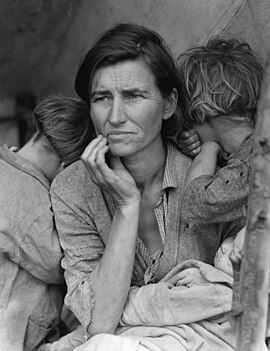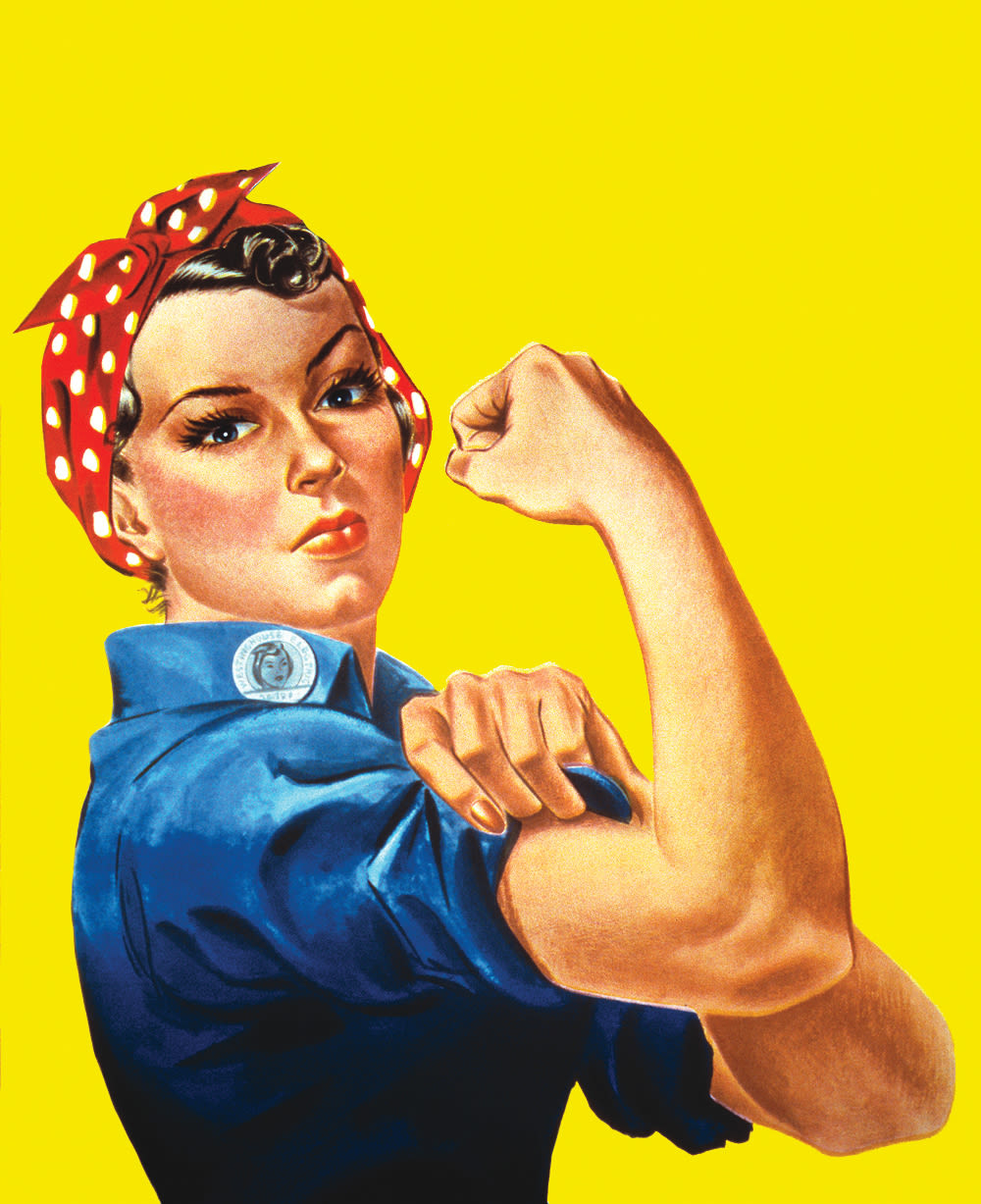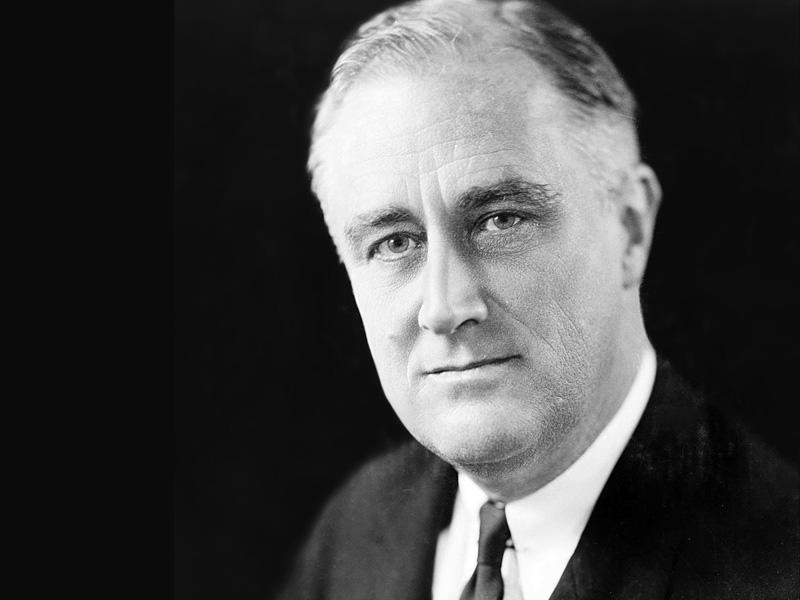Who took this photo?
Dorothea Lange
Who is this picture depicting?

Rosie the Riveter
What is this poster trying to say?

America under communism will be on fire basically.
Who was Rosa Parks? What did she do?
Rosa McCauley Parks was an American activist in the civil rights movement best known for her pivotal role in the Montgomery bus boycott. The United States Congress has honored her as "the first lady of civil rights" and "the mother of the freedom movement"
"You have nothing to fear but fear itself"
(Hint: was a president)
FDR

What was the "Dust Bowl"?
"the drought that occurred in the Mid/Southwest in 1930 was of such proportions that many could not even pay their taxes or other debts and had to sell their farms for no profit to themselves. The area was nicknamed "The Dust Bowl."
What happened on December 7th, 1941 and why was it important?
Pearl Harbor! It got the USA to join world war 2.
What does this picture have to do with the phrase "postwar boom"?

This is a LEVITTOWN and lots of white people were having babies (baby boomers)
What happened at Stonewall in 1969?
In 1969 police invaded a gay bar in NYC and for the first time, the LGBTQ community fought back and rioted. This led to the push for greater rights and visibility for gay people more broadly.
"Today we are engaged in a final battle, a final battle between communist atheism and Christianity"
(Hint: A politician)
Joseph McCarthy

Name 2 causes of the Great Depression?
1. Stock Market Crash of 1929
2. Bank Failures
3. People were buying less
4. American Economic Policy with Europe
5. Drought Conditions
Define isolationism and interventionism
Isolationism vs Interventionism: Prior to the war, there were two views on how the United States should respond. Isolationists believed it was not the United States’ job to be involved in the problems of Europe. Interventionists believed the United States should have a greater influence on foreign affairs, whether that be fighting wars abroad to protect humanitarian interests or to “export democracy”.
A Red Scare is a form of public hysteria provoked by fear of the rise, supposed or real, of leftist ideologies in a society, especially communism. This was led by Joseph MCarthy in the 1950s.
What were women trying to accomplish in the "second wave" feminist movement? (try to get a couple)
Reproductive rights (abortion/contraception)
Greater economic rights (equal wages/work access)
Sexual/Cultural liberation
The Equal Rights Amendment
“True peace is not merely the absence of tension; it is the presence of justice.”
(Hint, an activist)
Martin Luther King Jr.

What was the "New Deal"? What are two things it did specifically?
The New Deal was a series of programs and projects instituted during the Great Depression by President Franklin D. Roosevelt that aimed to restore prosperity to Americans.
Tennessee Valley Authority Act into law, creating the TVA and enabling the federal government to build dams along the Tennessee River that controlled flooding and generated inexpensive hydroelectric power for the people in the region, also while creating thousands of jobs
National Industrial Recovery Act that guaranteed workers would have the right to unionize and bargain collectively for higher wages and better working conditions.
Works Progress Administration Act (WPA). This bill provided thousands of jobs to Americans building post offices, bridges, schools, highways and parks. The WPA also gave work to artists, writers, theater directors and musicians.
Social Security Act of 1935, which guaranteed pensions to millions of Americans, set up a system of unemployment insurance and stipulated that the federal government would help care for dependent children and the disabled.
What was Japanese internment? Why did the USA think it was necessary? What impact did it have on Japanese-Americans?
Japanese internment was the imprisonment of thousands of Japanese Americans during World War 2. It was done because the USA was worried these citizens would act as spies for the Japanese in California.
This act devastated Japanese Americans moving forward economically and culturally and created a lot of racism.
What is propaganda? How was it used in the Cold War.
proaganda: information, especially of a biased or misleading nature, used to promote or publicize a particular political cause or point of view.
Both the USA and the SOviet Union tried to prove through propaganda that their way of life was superior.
Who were the "Freedom Riders" and what did they do?
Freedom Riders: On May 4, 1961, 13 “Freedom Riders”— seven African Americans and six whites–mounted a Greyhound bus in Washington, D.C., embarking on a bus tour of the American south to protest segregated bus terminals. They were testing the 1960 decision by the Supreme Court in Boynton v. Virginia that declared the segregation of interstate transportation facilities unconstitutional. On the way, they faced violence, persecution, and arrest.
"If you're not careful, the newspapers will have you hating the people who are being oppressed, and loving the people who are doing the oppressing!"
(Hint, an activist)
Malcolm X

Why did the KKK get so large/powerful in the 1920s?
Here are a few reasons:
-The KKK started to try and appeal to a wider range of Americans by becoming a social/religious club holding community events.
-The film "Birth of a Nation" spread their popularity.
-The United States, particularly in the north, was becoming more racially diverse from black migration and european immigration. Many white Americans didn't like this.
"News flash; one reason a woman gets married is to be supported by her husband while caring for her children at home. So long as her husband earns a good wage, she doesn't care about the wage gap between them."
(Hint, we just learned about her)
Phyllis Schlafly
